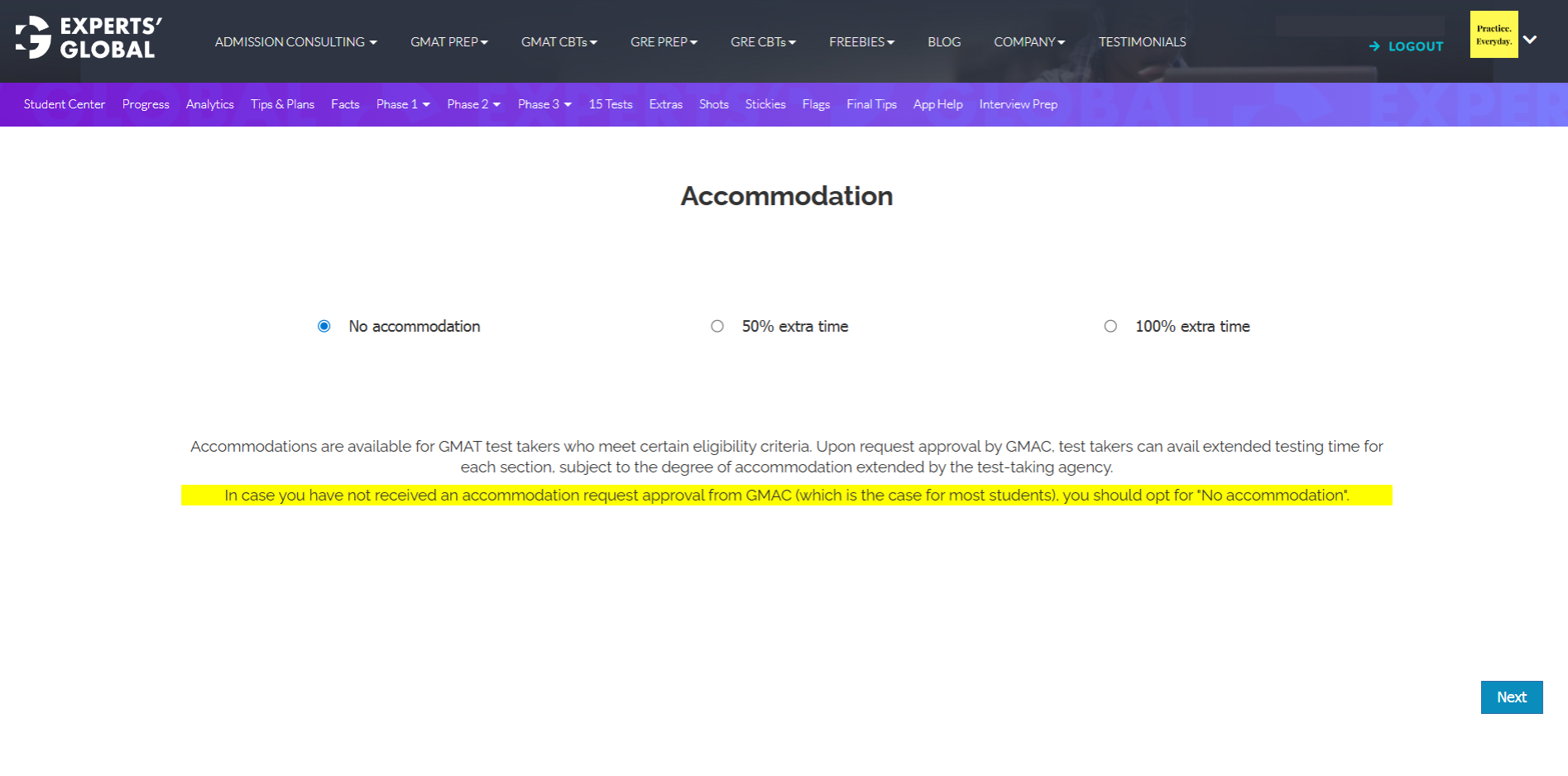Invest 30 seconds...
...for what may lead to a life altering association!
Help Line
- +91.8800.2828.00 (IND)
- 1030-1830 Hrs IST, Mon-Sat
- support@expertsglobal.com
...for what may lead to a life altering association!


GMAT accommodations provide testing flexibilities for candidates with documented disabilities. Examples include 50 percent extra time, 100 percent extra time, and longer breaks, along with other approved adjustments. These accommodations are confidential and not shared with business schools. Approval may take up to four weeks.
Did you know: Our GMAT test series includes 15 full-length GMAT practice tests with accommodations
The Graduate Management Admission Test (GMAT) is a critical component of the MBA admissions process for many business schools around the world. To ensure fairness and accessibility for all test takers, the Graduate Management Admission Council (GMAC), which administers the GMAT, offers accommodations for individuals with documented disabilities. Common accommodations may include relaxed testing conditions, assistive technology, or a separate testing environment. Candidates must submit a formal request supported by recent medical documentation before scheduling the examination. The review process can take up to four weeks, and only after approval can an individual book an accommodated testing appointment. Importantly, all accommodation-related information is kept confidential and is not shared with business schools.
GMAT accommodation refers to the support provided to test takers with physical, learning, or psychological disabilities. Adjustments made to the testing conditions of such test takers are intended to provide equal access to the examination without giving any undue advantage. Accommodations may include extended testing time, extra breaks, screen magnification, use of a reader or scribe, and wheelchair-accessible testing stations. To experience GMAT accommodation, you may want to take a GMAT diagnostic test with accommodation.
Accommodations are available for test takers whose disabilities meet the criteria set by GMAC. These may include:
No. GMAC does not disclose any information about testing accommodations to business schools. The official score report only contains the candidate’s scores, ensuring that admissions committees evaluate applicants solely on their performance in the exam.
Once submitted, the accommodation request is reviewed by Pearson VUE, the test administrator, in collaboration with GMAC. The review process typically takes up to four weeks, though some cases may take longer if additional documentation is requested. Candidates are advised to submit their request well in advance of any intended test date to allow time for processing.
Applicants should ensure that all documentation is recent, generally within the last five years, and includes a clear explanation of functional limitations. Vague or outdated reports may lead to delays or denial. It is also important to note that receiving accommodations in academic settings does not guarantee the same accommodations on the GMAT. The documentation must meet GMAC standards. Applicants are encouraged to retain copies of all forms and correspondence related to the accommodation process. Being organized and proactive can reduce the likelihood of delays.
Once an accommodation is approved, candidates will be given access to a specialized registration portal. Through this portal, the candidates can select a testing center that supports their specific accommodations or choose the online testing format if applicable. Not all accommodations are available for the online version of the GMAT, so it is important to confirm availability in advance. Additionally, please note that there is no provision for changing a preexisting registration to include accommodations. You must register for accommodation-supported examinations separately, through the specialized registration portal made available after receiving approval.
If a request is denied, applicants have the right to appeal. The appeal process involves submitting a written explanation addressing the reasons for the denial and providing any new or supplemental documentation that supports the original request. An appeal is treated as a fresh request and, thus, can take up to three weeks to process. Hence, the appeal must be made promptly to avoid missing preferred test dates.
If you are retaking the GMAT and your qualifying condition remains unchanged, you do not need to resubmit all documentation. Rather, in such a case, you need to request that the previously approved accommodations be applied to the new test date. However, if there is a change in diagnosis or condition, updated documentation may be required.
Yes. GMAC maintains strict confidentiality regarding disability-related information. Schools do not receive any details about accommodations; they see only the official GMAT score report, which does not indicate whether the test was taken with accommodations. This ensures that test takers are evaluated based on their results without bias.
Yes, our GMAT prep course fully supports testing accommodations. Before starting any of the 15 mock tests, the system presents a screen asking whether the candidate has an approved accommodation request. Based on the response, the test will allow either 50 percent extra time or 100 percent extra time, in line with the approved provision.
The screenshot below shows the pop-up that appears before a mock test begins, allowing the candidate to select the approved extra time option.

The GMAT is a rigorous examination, but accommodations make it accessible to individuals with documented disabilities. The process of securing accommodation requires careful preparation, clear documentation, and early planning, but it is designed to support fairness and equal opportunity. Candidates who believe they may qualify should begin the process early and consult with GMAT preparation professionals to ensure that their documentation meets the necessary criteria. Understanding your rights and options can help you navigate the accommodations process and perform your best on test day. By planning ahead and submitting a thorough application, you can gain access to the support needed to compete on a level playing field with your peers.